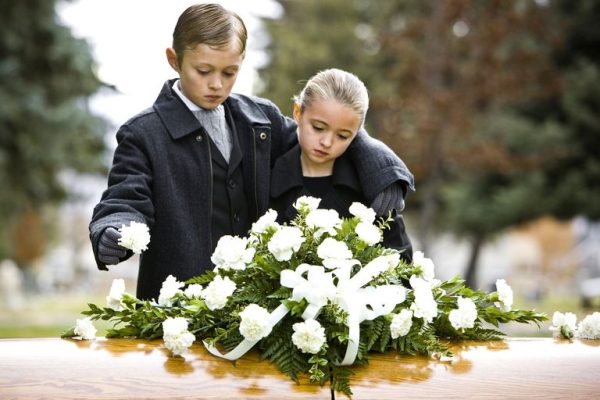Home>Theology and Spirituality>How Long Is A Lutheran Funeral


Theology and Spirituality
How Long Is A Lutheran Funeral
Published: March 3, 2024
Jason DeRose, Managing Editor at Christian.net, uses his expertise in religion and journalism to deepen understanding of faith's societal impacts. His editorial leadership, coupled with a strong academic background, enriches the platform’s diverse content, earning him recognition in both journalism and religious circles.
Discover the length and customs of a Lutheran funeral service, and find comfort in the theology and spirituality of this sacred tradition. Gain insight into the unique practices and beliefs that guide the funeral process.
(Many of the links in this article redirect to a specific reviewed product. Your purchase of these products through affiliate links helps to generate commission for Christian.net, at no extra cost. Learn more)
Table of Contents
Understanding the Length of a Lutheran Funeral
A Lutheran funeral is a sacred and solemn occasion that serves as a time for family and friends to come together to mourn the loss of a loved one and celebrate their life. The length of a Lutheran funeral can vary depending on several factors, including the specific traditions and customs of the Lutheran denomination, the preferences of the deceased and their family, and the cultural and regional variations within the Lutheran community.
-
Liturgical Traditions: Lutheran funerals typically follow a liturgical order of service, which includes prayers, scripture readings, hymns, and a sermon. These elements contribute to the overall length of the funeral service, as they are integral to the Lutheran faith and provide comfort and solace to the bereaved.
-
Personalization: The length of a Lutheran funeral can also be influenced by the degree of personalization desired by the family. For example, if the family wishes to incorporate special music, eulogies, or other personalized elements into the service, this can extend the duration of the funeral.
-
Communion: In some Lutheran traditions, the celebration of the Eucharist, or Holy Communion, may be included as part of the funeral service. This sacred ritual adds time to the overall length of the service but holds significant spiritual importance for many Lutheran congregants.
-
Grieving Process: Additionally, the length of a Lutheran funeral may be influenced by the need for the congregation to engage in the grieving process. Lutheran pastors and leaders understand the importance of providing sufficient time for mourners to reflect, pray, and find solace in the midst of their loss.
-
Cultural Considerations: Cultural and regional variations within the Lutheran community can also impact the length of a funeral. For example, certain cultural practices or local customs may influence the duration of the service, as well as any post-funeral gatherings or receptions.
Understanding the factors that contribute to the length of a Lutheran funeral can help both the family and the congregation prepare for this significant event. It is important to approach the funeral with reverence and sensitivity, honoring the traditions and beliefs of the Lutheran faith while also providing support and comfort to those who are grieving.
Read more: How Long Is A Baptist Funeral Service
The Order of Service for a Lutheran Funeral
The order of service for a Lutheran funeral is a structured and reverent framework that guides the proceedings of the funeral service. While specific practices may vary among different Lutheran denominations, there are common elements that are typically included in the order of service for a Lutheran funeral. Understanding these components can provide insight into the flow and duration of the funeral service.
Elements of the Order of Service
-
Invocation: The funeral service often begins with an invocation, a solemn opening prayer that seeks God's presence and guidance as the congregation gathers to mourn and remember the deceased.
-
Scripture Readings: The reading of scripture passages from the Bible is a central part of the Lutheran funeral service. These readings may include verses that offer comfort, hope, and assurance of eternal life, reflecting the core beliefs of the Lutheran faith.
-
Hymns and Music: Music plays a significant role in Lutheran worship, and funeral services are no exception. Hymns and other musical selections are interspersed throughout the service, providing opportunities for congregational singing and moments of reflection.
-
Sermon or Homily: A sermon or homily delivered by the presiding pastor is a customary part of the Lutheran funeral service. This message often offers words of comfort, shares reflections on the life of the deceased, and provides spiritual encouragement to those in attendance.
-
Prayers and Petitions: The offering of prayers and petitions is an integral aspect of the Lutheran funeral service. These prayers may include intercessions for the deceased, expressions of grief and hope, and supplications for strength and comfort.
-
Commendation and Committal: The commendation is a formal blessing and farewell to the deceased, affirming their entrance into God's eternal care. Following the commendation, the committal takes place at the graveside or the location of interment, where the body is laid to rest with final prayers and blessings.
-
Holy Communion (optional): In some Lutheran traditions, the celebration of Holy Communion may be included as part of the funeral service, providing an opportunity for congregants to receive the sacrament as a source of spiritual nourishment and unity.
Significance of the Order of Service
The order of service for a Lutheran funeral is designed to honor the life of the deceased, offer comfort and hope to the bereaved, and affirm the central beliefs of the Lutheran faith. Each element of the service contributes to the overall experience, guiding mourners through a journey of remembrance, reflection, and spiritual consolation. By following this structured order, Lutheran congregations can find solace and strength as they gather to commemorate the life and legacy of the departed.
Factors That Can Impact the Length of a Lutheran Funeral
-
Liturgical Traditions: Lutheran funerals typically follow a liturgical order of service, which includes prayers, scripture readings, hymns, and a sermon. These elements contribute to the overall length of the funeral service, as they are integral to the Lutheran faith and provide comfort and solace to the bereaved.
-
Personalization: The length of a Lutheran funeral can also be influenced by the degree of personalization desired by the family. For example, if the family wishes to incorporate special music, eulogies, or other personalized elements into the service, this can extend the duration of the funeral.
-
Communion: In some Lutheran traditions, the celebration of the Eucharist, or Holy Communion, may be included as part of the funeral service. This sacred ritual adds time to the overall length of the service but holds significant spiritual importance for many Lutheran congregants.
-
Grieving Process: Additionally, the length of a Lutheran funeral may be influenced by the need for the congregation to engage in the grieving process. Lutheran pastors and leaders understand the importance of providing sufficient time for mourners to reflect, pray, and find solace in the midst of their loss.
-
Cultural Considerations: Cultural and regional variations within the Lutheran community can also impact the length of a funeral. For example, certain cultural practices or local customs may influence the duration of the service, as well as any post-funeral gatherings or receptions.
Understanding these factors is crucial for both the family and the congregation to prepare for the length of a Lutheran funeral. It is important to approach the funeral with reverence and sensitivity, honoring the traditions and beliefs of the Lutheran faith while also providing support and comfort to those who are grieving.
Read more: How To Become A Lutheran
Cultural and Regional Variations in Lutheran Funeral Length
Cultural and regional variations within the Lutheran community can significantly impact the length of a funeral service. These variations are influenced by diverse customs, traditions, and practices that are deeply rooted in the cultural fabric of different Lutheran congregations. Understanding these variations is essential for appreciating the rich tapestry of Lutheran funeral customs and the diverse ways in which they manifest across different regions and cultural contexts.
1. Ethnic Traditions
In many Lutheran communities, especially those with diverse ethnic backgrounds, cultural traditions play a pivotal role in shaping the length of funeral services. For example, Lutheran congregations with Scandinavian heritage may observe customs that differ from those of congregations with German, Finnish, or Swedish roots. These ethnic traditions can influence the duration of the funeral service, as well as any post-funeral gatherings or receptions, reflecting the unique cultural expressions of mourning and remembrance.
2. Regional Practices
Regional practices within the Lutheran community also contribute to variations in funeral length. Different geographical areas may have distinct customs and rituals associated with funeral services, leading to differences in the overall duration of the proceedings. For instance, Lutheran congregations in rural settings may observe traditions that differ from those in urban or suburban areas, impacting the length of the funeral service and any accompanying rituals or ceremonies.
3. Community Customs
The customs and practices of the local Lutheran community can significantly influence the length of a funeral service. These customs may encompass a wide range of traditions, including specific prayers, hymns, or cultural rituals that are integrated into the funeral proceedings. Additionally, the level of community involvement and participation in the funeral service can also impact its duration, as congregations with deeply ingrained customs may have longer services to accommodate these traditions.
Read more: 20 Funeral Prayers
4. Synodical Differences
Differences in synodical affiliations within the Lutheran tradition can contribute to variations in funeral length. Each synod may have distinct guidelines or practices related to funeral services, leading to differences in the order of service, the inclusion of specific rituals, and the overall duration of the funeral. Understanding these synodical differences is crucial for recognizing the diverse expressions of Lutheran funeral customs across different denominational affiliations.
5. Interfaith Influences
In regions where Lutheran communities interact with diverse religious traditions, interfaith influences can impact the length of funeral services. Interfaith collaborations or shared practices with other religious denominations may introduce elements that contribute to the duration of the funeral service, reflecting the dynamic interplay between different faith traditions and their impact on Lutheran funeral customs.
By acknowledging and understanding these cultural and regional variations, both within and beyond the Lutheran community, individuals can gain a deeper appreciation for the diverse expressions of Lutheran funeral customs and the rich tapestry of cultural influences that shape the length and character of funeral services.
How to Prepare for the Length of a Lutheran Funeral
Preparing for the length of a Lutheran funeral involves thoughtful consideration and planning to ensure that both the family and the congregation can participate in the service with reverence and understanding. By acknowledging the significance of the funeral and taking proactive steps to prepare for its duration, individuals can navigate the experience with grace and compassion.
1. Communication with the Clergy
Engage in open communication with the clergy or the presiding pastor who will officiate the funeral service. Discussing the order of service, the inclusion of specific elements such as music or personal tributes, and the overall flow of the funeral can provide clarity on the expected duration and help in preparing for the emotional and spiritual aspects of the service.
Read more: How To Be A Deacon In The Lutheran Church
2. Informing Attendees
Inform family members, friends, and other attendees about the anticipated length of the funeral service. Providing this information in advance can help individuals plan their participation and make necessary arrangements, especially if the service is expected to be longer than usual.
3. Time Management
Allocate sufficient time for the funeral service and any post-funeral gatherings or receptions. Understanding the potential length of the service can aid in managing the schedule of the day, allowing for ample time for reflection, fellowship, and the commemoration of the deceased.
4. Personal Reflection
Encourage personal reflection and emotional preparation for the length of the funeral. Recognize that the service may encompass various elements, including prayers, scripture readings, music, and a sermon, and prepare oneself for the emotional impact of these components.
5. Support for the Bereaved
Offer support and understanding to the bereaved as they prepare for the length of the funeral. Recognize that the duration of the service may be emotionally taxing, and provide comfort and companionship to those who may find the experience challenging.
Read more: How Many Sacraments In The Lutheran Church
6. Cultural Sensitivity
Respect and honor the cultural and regional variations that may influence the length of the funeral service. Embrace the diversity of Lutheran funeral customs and be mindful of the unique traditions and practices that may shape the duration of the service.
7. Spiritual Preparation
Engage in spiritual preparation by seeking solace and strength through prayer, meditation, and reflection. Embracing the spiritual significance of the funeral service can help individuals prepare for the length of the service with a sense of reverence and spiritual fortitude.
By proactively preparing for the length of a Lutheran funeral, individuals can approach the service with mindfulness, compassion, and a deep appreciation for the sacred and communal aspects of the occasion. This preparation fosters an environment of support and understanding, allowing both the family and the congregation to participate in the funeral service with reverence and grace.











